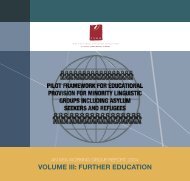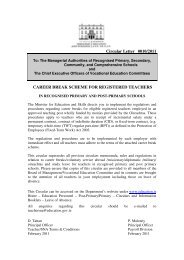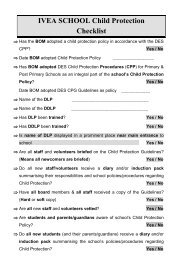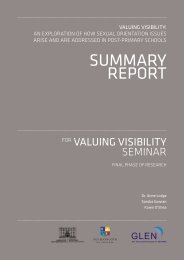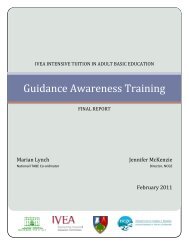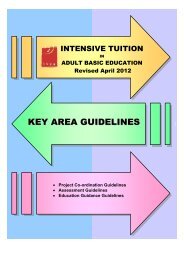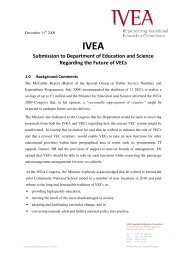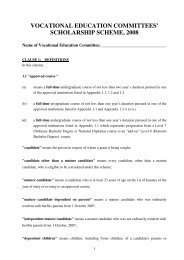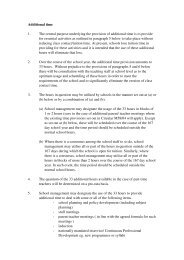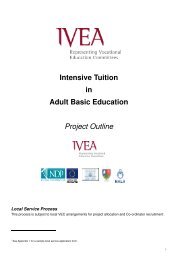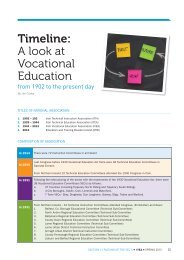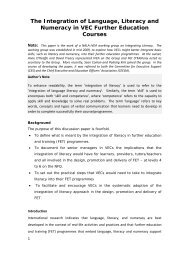Download File - IVEA
Download File - IVEA
Download File - IVEA
Create successful ePaper yourself
Turn your PDF publications into a flip-book with our unique Google optimized e-Paper software.
Definitions<br />
Unaccompanied Minor<br />
Unaccompanied minors are children who are separated from both<br />
parents and are not being cared for by an adult who, by law or<br />
custom, is responsible to do so 2 .<br />
6<br />
Legal Terms<br />
Asylum Seeker<br />
A person who arrives spontaneously in the State seeking to be<br />
granted protection under the Refugee Convention.<br />
Leave to Remain<br />
Leave to remain is granted at the discretion of the Minister for Justice,<br />
Equality and Law Reform as an exceptional measure to allow a person<br />
to remain in the State who does not fully meet the requirements of the<br />
Refugee Convention but who may still need protection.<br />
Programme Refugee<br />
A person who has been given leave to enter and remain by the<br />
Government - usually in response to a humanitarian crisis - at the<br />
request of the United Nations High Commissioner for Refugees<br />
(UNHCR).<br />
Refugee<br />
A person who has been recognised as needing protection under<br />
the Refugee Convention. In the Convention, a refugee is defined as<br />
someone who has a well-founded fear of persecution for reasons of:<br />
race, religion, nationality, membership of a particular social group,<br />
or political opinion; is outside the country they belong to or normally<br />
reside in and is unable or willing to return home for fear of persecution.<br />
Refugee Convention<br />
The United Nations Convention relating to the Status of Refugees<br />
1951 and 1967 Protocol.<br />
Separated Children<br />
The Separated Children in Europe Programme (1999) defines ‘separated<br />
children’ as: children under 18 years of age who are outside their country<br />
of origin and separated from both parents, or their previous legal/<br />
customary caregiver. Some children are totally alone while others …<br />
may be living with extended family members… Separated children<br />
may be seeking asylum because of fear of persecution or the lack<br />
of protection due to human rights violations, armed conflict and<br />
disturbances in their own country. They may be victims of trafficking<br />
for sexual exploitation or other exploitation, or they may have travelled<br />
to Europe to escape conditions of serious deprivation 1 .<br />
1<br />
Separated Children in Europe Programme Statement of Good Practice, Save the Children Alliance/UNHCR Brussels: 1999, Section 2.1.<br />
2<br />
UNHCR Refugee Children: Guidelines on Protection and Care UNHCR: Geneva: 1993.<br />
3<br />
Department of Education and Science Promoting Anti-racism and Interculturalism in Education: Draft Recommendations towards a National Action Plan Dublin: 2002.<br />
http://www.education.ie/servlet/blobservlet/fe_antiracism_report.doc<br />
4<br />
Lam, A. “Bilingualism” in Carter, R. & Nunan, D. (ed.s) The Cambridge Guide to Teaching English to Speakers of Other Languages, Cambridge University Press, Cambridge: 2001.<br />
5<br />
Skuttnabb-Kangas, T. and Philipson, R. (eds.) Linguistic Human Rights: Overcoming Linguistic Discrimination, Mouton de Gruyter, Berlin and New York: 1994.<br />
6<br />
MacPherson, W. The Stephen Lawrence Inquiry: Report of an Inquiry by Sir William MacPherson of Cluny, presented to Parliament by the Secretary of State for the Home Department by Command of Her Majesty, London: 1999.<br />
7<br />
NCCRI Guidelines on Anti-Racism and Intercultural Training, NCCRI, Dublin: 2002.<br />
Terms referring to People and Practices<br />
Anti-racism<br />
Anti-racism refers to all strategies that contribute to the elimination of<br />
racism in all its forms, interpersonal and institutional 3 .<br />
Assimilation<br />
An approach to diversity which forces a minority ethnic group(s) to<br />
abandon its own cultural practices and values and be absorbed into<br />
the dominant culture. An assimilationist assumes the superiority of the<br />
dominant or host culture.<br />
Bilingual<br />
“Bilingualism refers to the phenomenon of competence and<br />
communication in two languages. A bilingual individual is someone<br />
who has ability to communicate in two languages alternately” 4 . Most<br />
bilingual speakers will have learned two languages within the family<br />
from native speakers since infancy 5 .<br />
Ethnic Minority<br />
Ethnic minority is a generic term used to describe people who are<br />
identifiably different to the ethnic majority because of their ethnic<br />
origin (including language or religion).<br />
Institutional Racism<br />
“The collective failure of an organisation to provide an appropriate<br />
or professional service to people because of their colour, culture<br />
or ethnic origin. It can be seen or detected in processes, attitude<br />
and behaviour which amount to discrimination through unwitting<br />
prejudice, ignorance, thoughtlessness, and racist stereotypes which<br />
disadvantage minority ethnic people” 6 .<br />
Interculturalism<br />
“[The] acceptance not only of the principles of equality of rights,<br />
values and abilities but also the development of polices to<br />
promote interaction, collaboration and exchange with people of<br />
different cultures, ethnicity or religion living in the same territory…<br />
interculturalism is an approach that can enrich a society and<br />
recognises racism as an issue that needs to be tackled in order to<br />
create a more inclusive society…” 7 .



